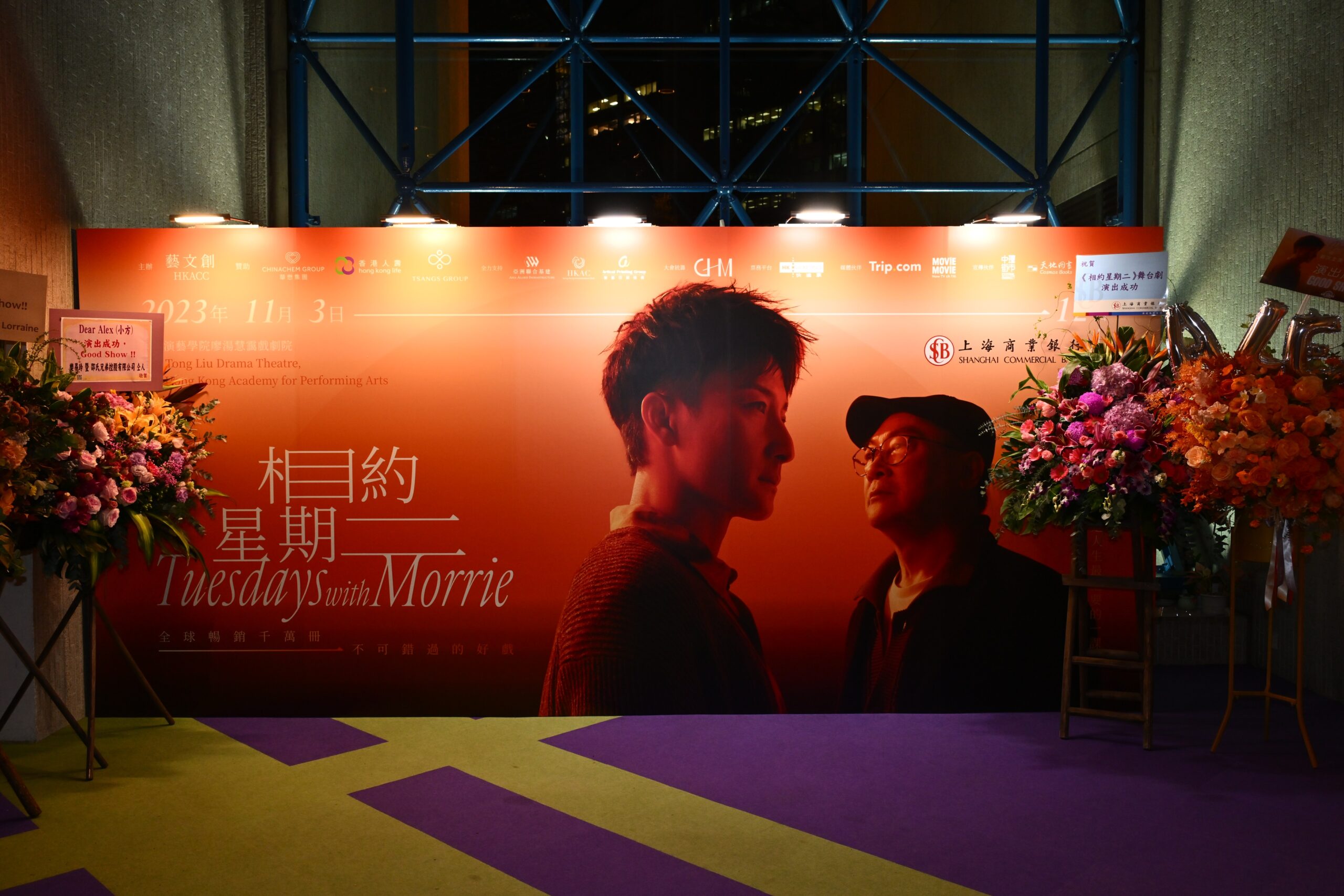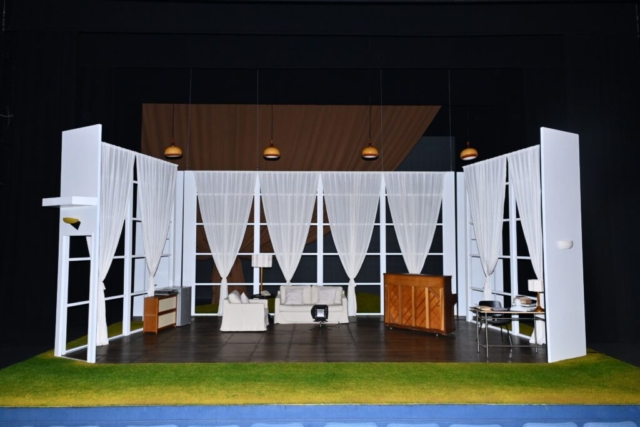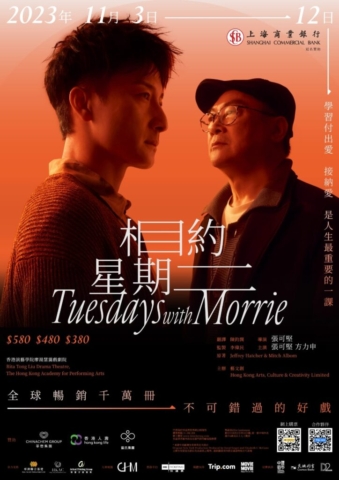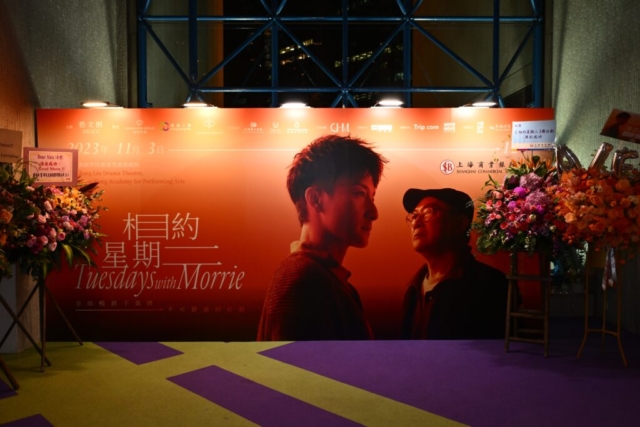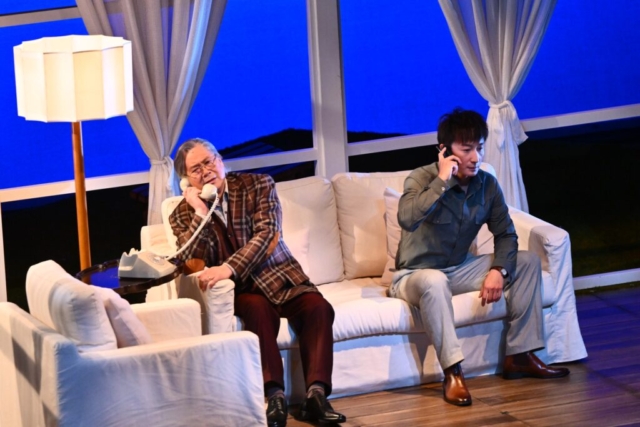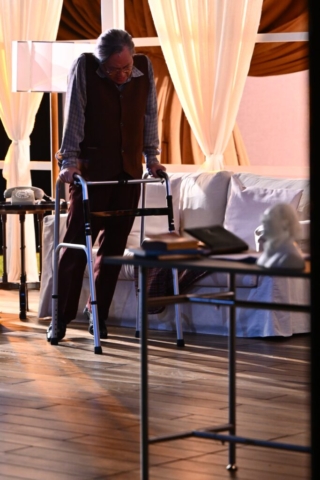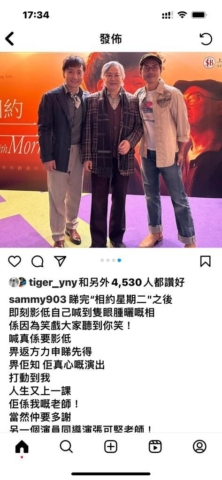28-11-23
Actor Paul Engle said, “We cannot move mountains. Let us make light.”
I did it! I produced a play called Tuesdays with Morrie with director Dominic Cheung and actor Alex Fong! Yesterday’s successful 12 shows are my today’s memory. Good comments reverberated in Hong Kong. Today is tomorrow’s dream. I am still recuperating and dreaming…
To create a successful play, it is more than a good story. We must think about the performance—about what will be holistically happening on stage with sets, sounds, lighting, costumes and importantly, actors. Apart from the above, a play has its meaning within a larger context—the satisfaction among the audience, the value of the work and ideally, the approval by art critics.
Some things must be learnt by experience, and the experience of misjudgment is however costly. A failure is not always a mistake. It can be the best that one can accomplish under the bad circumstances. So, it is important, after a project, to review what might be the bad circumstances. Avoid them in future.
I would like to highlight my observations about handling this theatrical project to a few points and wish they could be of use to friends who might benefit from these guiding words.
1. Clear Customer Segmentation
The market is too big. Marketing expenses are too huge. You must bravely identify the ‘target customers’ of a drama project and classify them according to demographic, psychographic and behavioural characteristics. Pick the right sector and use the correct ways to reach them. It is a challenge on your wisdom. For Tuesdays with Morrie, we initially targeted at young cultural people. The strategy did not work well. It ended up that the most supportive audience were those who were interested in the spiritual and educational meaning of our play: the exploration into life and death. But, as things including the poster were fixed, it was too late to change the marketing plan. We could have done better.
2. A ‘70% Audience’ Break-even Budget
I never intend to make money in a drama project. My focus is the struggle on not losing money. After my experience of 3 stage projects, it is essential to aim prudently at that a project can break even if 70% of the audience seats can be filled up. Economy is right now bad and leaving for a weekend getaway in the neighbouring Greater Bay Area cities is a popular trend. These all affect adversely the box office of a local play. A cautious income and expenditure account is very needed when you want to keep some money for your next project.
Never leave your budget too marginal as deductions exceeding income earned can be a dangerous thing in a drama project.
3. Get A Well-known Film Or TV Actor To Play A Part, If Possible & Appropriate
Stars are the widely recognized persons in a society. They attract audience. This is why stars matter. For those well-known actors who agree to play a part in a play, they usually realize that the fee will be modest and the participation is out of passion or interest. They will bring free publicity for your play and boost the event virally on Facebook, Instagram and WeChat.
Do not look down upon working with film or TV actors as unprofessional or downgrading, because some of them can be equally brilliant on stage.
4. KOL And Subway Marketing
Most people in Hong Kong travel by subway (i.e. MTR). Even a small poster there will draw favorable attention to your target audience. MTR marketing is high-priced but it is worth the money. My personal experience is that it will increase ticket sales by 3 to 4 times.
Do not be afraid of its high cost. The rule is simple: you pay peanuts, you get monkeys.
For KOLs (i.e. social influencers), they normally command a group of followers on social media. When they praise your play, it will be a very effective way to create trust and credibility on what you are doing. Their words are regarded as being honest and reliable by the followers.
We wince with pain at that newspapers and magazines are in a declining state. People want real-time information on their mobile phones and computers; or paradoxically, from friends. Your money on print advertising should be reduced to a minimum.
5. Smaller Theatre Over A Longer Period Of Time & Sell Tickets By Phases
Audience are critical and smart these days. Not being ‘early birds’ anymore, they will not buy tickets until the last minute when they can find out from the social media whether your play is good or not. The ‘Judgement Day’ is the first day of your show, after people watch your work and quickly comment on the internet. Any performing artist nowadays cannot turn a deaf ear to public opinion. Bad performances, after being bad-mouthed, can die in the blink of an eye. In contrast, great feedbacks from audience can rescue a play and make it a surprise box-office hit after the initial few days. It may therefore not be a sensible strategy to book a big theatre and finish the play within 2 to 3 days. It is wiser to book a smaller place and put up the show for a longer period of time, say 7 days or more. The advantage will be that when positive comments are received on the work, you will be able to catch a large number of ‘late birds’ who will buy tickets to support the rest of the shows. This strategy works very well for our play Tuesdays with Morrie!
6. Know A ‘Mr Right’ In The Trade
There is a famous book called The Tipping Point! It is about how little things can make a big difference. In the drama world, the tipping point is to get to know the ‘Mr Right’. I am a bad ‘Mr Salesman’ (the term used in the book). My actor partner Alex Fong (方力申) is good. He is friendly and sincere to his fans and so many people gave him very warm support. We have also got a ‘Mr Connector and Maven’ (again, the term used in the book) who is our actor and director Dominic Cheung (張可堅). He is accountable for building huge momentum in terms of gathering the able teammates to our project. Dominic has been in the field for more than 40 years. He knows almost everyone, and naturally connects talented people across different roles.
I am an amateur producer but I am clever enough to get hold of Dominic, and then the whole project starts to catch fire!
Remember: while you do not know a trade too well, you have to make sure you surround yourself with the right people: competent professionals who can helpfully take you as their teammate and assist you to accomplish the goals.
7. Accept Dissatisfaction And Learn To Compromise
It takes 2 flints to make a fire. The business magnate Henry Ford once said, “Coming together is a beginning. Keeping together is progress. Working together is success.” In the art circle, everyone is likely to be individualistic and subjective. You have to respect them and learn to be tolerant. However, it is important to let them know the overall team’s goals. Lack of clear goal is the most common cause of conflict among team members. I always insisted, “While you can use your own good ways to work on individual goals, do not forget our overall goal: a tasteful, meaningful and popular show within the balanced budget!” I tried to praise teammates by ‘Wow’ and instead of ‘Bow Wow’!
The best play comes from men and women who are willing to contribute their great work independently toward one common goal of success in unison. The value of achievement of our Tuesdays with Morrie lies not in its box-office success but in its showcase of a group of wholehearted drama professionals in making such a thought-provoking drama about the true meaning of living and dying: a wonderful professor who lived fully and so was prepared to die at any time.
May Professor Morrie rest in peace…
This article can also be found at the following sites:






